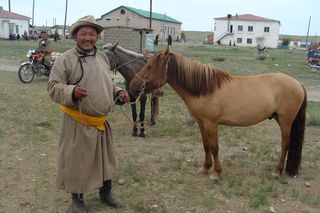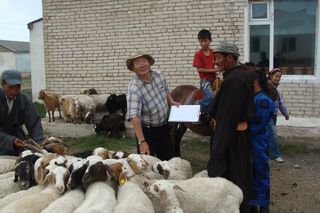In Mongolia, a so called dzud poses a very frequent and probably the most striking type of natural hazard. It is caused by multiple factors of draught summer followed by severe winter with extremely low temperatures and usually a lot of snow which prevents animals from reaching the grass. Caritas Czech Republic distributed livestock to 40 herder families affected by natural disaster “dzud.
 All these factors together result in huge losses in herds, the main source of subsistence for majority of rural Mongolians. Therefore, each dzud means a possibility of acute food insecurity and loss of livelihood.
All these factors together result in huge losses in herds, the main source of subsistence for majority of rural Mongolians. Therefore, each dzud means a possibility of acute food insecurity and loss of livelihood.
Since April 2010, Caritas Czech Republic (CCR) has been implementing a humanitarian project focused on livelihood recovery of herders severely affected by the strong dzud which hit Mongolia in the winter 2010. The project place is Bayan - Ondor soum (district) in the Ovorhangai Province which is situated some 350 km southwest from the capital city of Ulaanbaatar. This province was the most affected with 1,287,501 head of stock being lost.
The main activity of the project is restocking since the opportunities of alternative income generation activities are still rather limited in the countryside. Selection of the forty beneficiary families was based on personal interviews with each family representative conducted by the project manager, her assistant and an external consultant specializing in animal husbandry. When making the selection, not only the necessity of the aid in individual cases was assessed but also the ability of the households to breed the donated livestock. Those selected lost so many head of livestock that their subsistence was endangered and they did not have any alternative source of income at the time.
At the end of July, the project manager together with her assistant and an external expert (zoologist) went again to Bayan – Ondor in order to organize and conduct the purchase of the animals and their subsequent distribution to the beneficiaries.
The team responsible for purchasing the animals and for their distribution among beneficiaries had 6 members and consisted of both CCR's and local administration representatives including local veterinarian, Bayan-Undor soum’s governor and the leader of the bagh (bagh is the lowest administrative unit in Mongolia).
 The process moved very quickly. The zoologist and local veterinarian checked the health status of animals brought by sellers and if everything was ok the CCR employees concluded a contract with them. The purchased livestock was then earmarked and distributed among the herders who were present onsite. A donation agreement was signed with each beneficiary. The order was organized by the bagh leader and soum governor. In several cases the animals did not meet the health criteria and were therefore replaced. Herders who received animals drove them to places where they live. In total, 2000 head of livestock were purchased and distributed among 40 beneficiaries.
The process moved very quickly. The zoologist and local veterinarian checked the health status of animals brought by sellers and if everything was ok the CCR employees concluded a contract with them. The purchased livestock was then earmarked and distributed among the herders who were present onsite. A donation agreement was signed with each beneficiary. The order was organized by the bagh leader and soum governor. In several cases the animals did not meet the health criteria and were therefore replaced. Herders who received animals drove them to places where they live. In total, 2000 head of livestock were purchased and distributed among 40 beneficiaries.
Training for the local herders in sustainable pasture management and disaster risk reduction will be the next activity of the project. It is scheduled for the end of August. The purpose of the training is to increase the sustainability of the project outcomes since pasture degradation and dzud risk makes the Mongolian herders extremely vulnerable.







